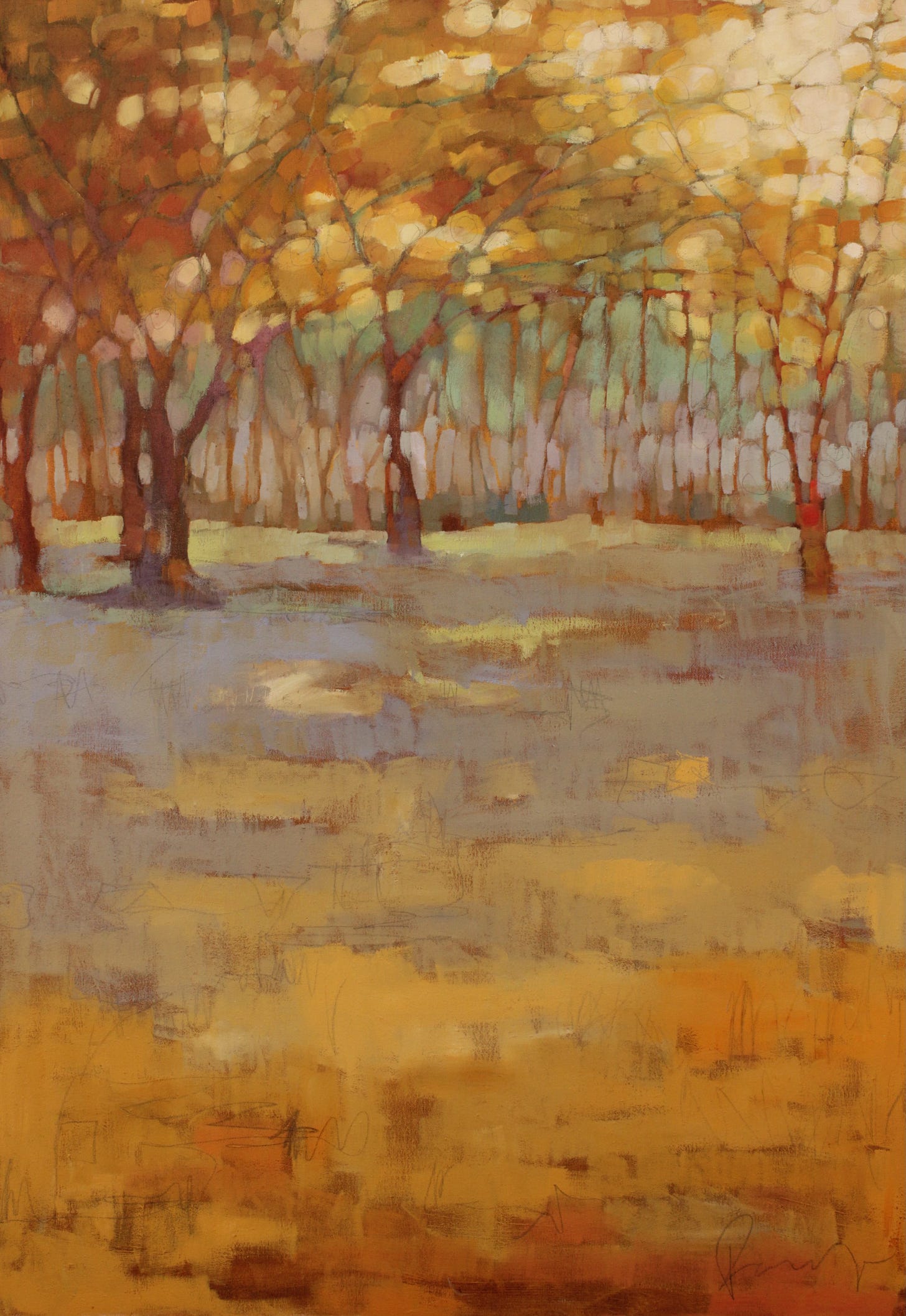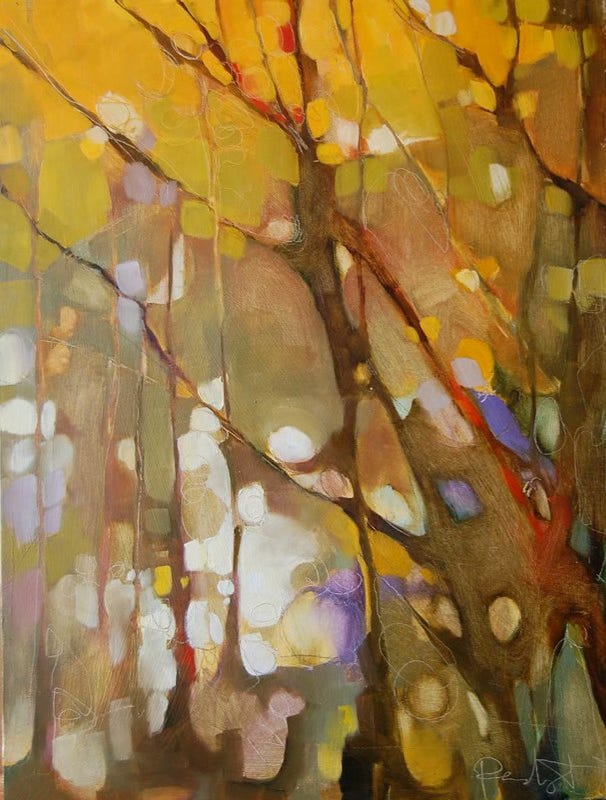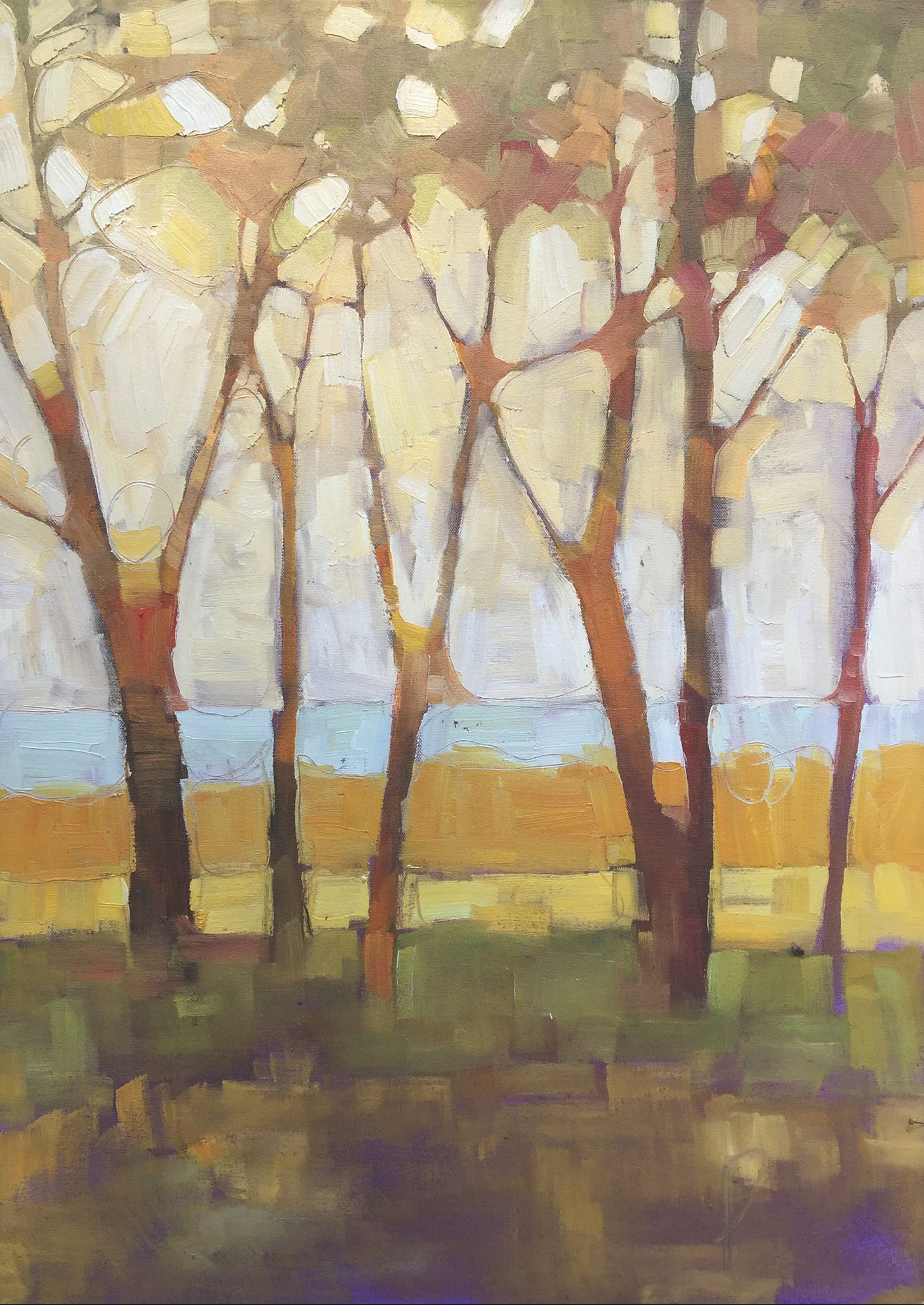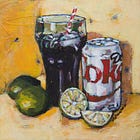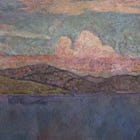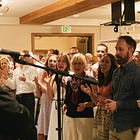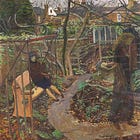To Climb a Tree
Becoming Rooted in Shenandoah
When I was a college student in New York City, I often daydreamed about climbing trees. It would happen like this: I would look up from my desk, my eyes dizzied from the itty-bitty textbook font they had been parsing for the past hour, and stare out the window. There wasn’t much of a view—my window directly faced the brick dorm room across from mine—but there was a tree whose thick branches swept in and provided the only pop of variety in the rectangular scene. My imaginary self would climb out onto the fire escape, hop onto said branches, and make her way up.
Unfortunately, my real self never thought she had the physical agility or the time to climb trees. It was far more practical to climb preprofessional and academic ladders. My life was composed of studying, volunteer shifts, and hurried lunches on subway commutes that carried me from one extracurricular responsibility to another. I scheduled catching up with friends in whatever rectangular sliver of time Google Calendar told me I could spare. I wanted to become a doctor, and this was what people told me I had to do to get there. Family members lovingly remarked that I had my whole future ahead of me, and I wanted nothing more than to skip ahead to it. To me, the present was about the future, and so it felt expendable. Year after year, I put my head down and went through the motions. Surely I would thank myself someday.
The coronavirus pandemic brought with it a sudden and sorely needed reality check. With the nationwide transition to remote classes, I said goodbye to my tree in the window when I moved out of my dorm room in the city and into my father’s rural childhood home where he was living at the time. It was a 250-year-old farmhouse in the heart of the Shenandoah Valley that had housed my family for eight generations, ever since my fifth great-grandfather purchased the land around the time of the Revolutionary War. Entering through its doors was like setting foot in an ancestral museum of sorts. “That’s where Mom made soap out of lye,” my father would reminisce, “and that table corner is where your Uncle Joe knocked out his front teeth during a game of tag.”
When I first arrived in Virginia, the world felt like it had been flipped on its head. I had spent most of my life up to that point within a highly structured academic environment, striving for the top grades and most impressive accolades. Now all of a sudden, grading systems were pass/fail, extracurricular activities ceased to exist, and free time was in gross abundance. For the first time in a long time, I was left to sit with my real self. The problem was I had no idea what to do with her.
Looking back on my undergraduate years, I came to the sobering realization that I could only remember a handful of moments. Everything else had coalesced into a singular haze of late nights at my desk. This terrified me. If I kept doing what I was doing, would my whole life be reduced to a similar haze of indistinguishable workdays? I could already feel the pangs of regret and sadness that would overwhelm my older self upon realizing that there was little in her life to look back on. Delayed gratification was the name of the game I was playing, but I had only just grasped that time would run out one day.
I wanted a life that was worth telling my future children about—one full of excitement, happiness, and meaning. But what made me happy? What mattered to me? Societal standards told me that someone with my background and credentials should be on the fast track to a good life, whatever that meant. Yet here I was, a soon-to-be college graduate, and I didn’t know the answers to such basic questions. I had trained myself for so long to be a certain type of person that I found it extremely difficult to disentangle that person from who I really was.
Funnily enough, there was a tree just like the one in New York peeking into view through the window frame of my new room. This time, I decided to go outside and sit beneath it.
To say the valley was beautiful would be doing it a disservice. My new backyard was a vast tapestry of lush green pastures and sun-kissed rolling hills, punctuated by winding streams and lively family farms. When the sun set, the clouds were spun into pink cotton candy tufts.
My family’s history was woven into this farmland even more deeply than into the farmhouse. For over two centuries, those 160 acres and the livestock that lived on the land had fed and sustained my ancestors. They were conservative Mennonites from Germany who immigrated to America in search of religious freedom and economic opportunity. The valley offered them the fertile land they needed to cultivate their family and their faith. When their time came, many chose to be buried in the family cemetery and return to the soil that had nourished them. The cemetery plot still sits in its own idyllic pocket on the farm, perched on top of a hill overlooking the Blue Ridge Mountains. The valley continues to be home to a large Mennonite community that includes many of my family members. Although most of them have broken away from some of the community’s more traditional practices, their faith remains their foremost guiding force in life. When I was growing up, my father occasionally shared accounts of his upbringing on the farm and in the Mennonite church, but I never thought much about these parts of my heritage until the farm started to feel like home.
I began taking walks regularly. To tread along the same paths my predecessors once did recentered me in a way I didn’t expect. Their decades of labor on this very land made my existence possible, and for that, I felt an immense gratitude. I had always known factually where I came from, but it felt completely different to internalize it and conceptualize myself as being part of a bigger legacy. Occasionally, I would run into some relatives who lived on the other side of the farm. They were always on an adventure: they swam in streams in the forest, played with wild animals, and hurtled down the hills in their ATVs. There was a certain trust they had in the land that I marveled at; in situations where I would be wary of getting lost or hurt, they were unafraid and full of life.
Being in their company gradually broadened my appreciation for the world around me. My life before the pandemic had wound my thoughts into tight, rigid coils, but being in this space was slowly releasing the tension. My mind was freed to wander and reflect in ways that it hadn’t since I was younger. Before I knew it, I was operating large farm equipment, jumping on top of hay bales, planting trees, and befriending a group of stray cats that lived on the farm. I did actually try to climb a tree, though I didn’t get far. These are all simple things, but they brought me a new sense of peace that I didn’t want to let go of. To place your faith in the earth upon which you walk is to allow your eyes to look to the world above. The running joke in the family was that the city girl had been converted into a farmhand.
Everyone in the community treated one another with the same respect and trust they gave the land. One of the first times I went for a walk, several passersby honked and greeted me from the road as they drove past the house. Initially, this puzzled me—the parallel situation in Manhattan would have been interpreted as peculiar and potentially unnerving. In reality, these people were continuing to look out for their neighbors even during a time of unprecedented social isolation.
Why did I see a simple gesture of kindness with such skepticism? Sure, there were natural cultural differences, but it felt bigger than that. Kindness was enacted for kindness’s sake. It really was that simple. Everyone understood compassion and peacemaking through the word of God and spent their days spreading both.
Whenever my father ate at a restaurant by himself, his bill was more often than not picked up by unidentified strangers. He could have taken insult from the possibility that these people pitied him, but instead, he was grateful. A family friend paid for hotel rooms and offered transport to those without a home on especially cold nights. He could have assumed the worst of these individuals and passed them by, but he did not. A neighbor and devoted father mowed a heart the size of a baseball diamond on the side of the road every few days to memorialize his love for his family. People did not concern themselves with questioning others’ motives or backgrounds or anything of the sort. Instead, it was the default to assume good and true intentions. In my experience, it was the other way around in most places. However, being on the receiving end of this kindness showed me that that did not have to be the case. To have strangers go out of their way to help me made me want to be better for them and others.
In the Mennonite faith, simplicity is a companion to compassion. Theirs is a world where prestige, social status, and material wealth hold little importance. They believe that God created humans to better the world and the lives of one another. How each person carries this out depends on the strengths and gifts they are endowed with. If recognition and abundance are byproducts of the journey, then that is fine, but they should not be ends themselves. This makes for a life less crowded by these pursuits, with greater room for things more fundamentally human—namely family, faith, and self-reflection—things I had historically pushed to the side. To see that there was a world where your achievements were peripheral to who you were lifted an enormous weight off my shoulders. The members of this community lived their lives in ways that pushed against nearly every aspect of how I was used to living, and yet I saw that they were content. Their contentment came, in some cases, because they seemed to possess answers to questions I did not and, in other cases, because they seemed committed to asking deeper questions even when answers did not present themselves.
That includes how to think about death. One perfectly normal afternoon, my uncle passed away from a sudden heart attack. It happened right before my father and I were about to meet him for one of our weekly picnics. To me, death was too-big funeral halls filled with more tears and regrets than people. Death was head-splitting grief that pulled families apart. It was the greatest enemy to us all.
But what if it didn’t have to be? Here, to my surprise, death was a complicated ally. It still imposed a deep sadness and pain, but it was not malicious. I remember it was especially beautiful and sunny on the day of my uncle’s funeral. This felt odd at first—anything pleasant or positive seemed out of place, wrong even. Yet, when I looked around, I saw attendees fondly reminiscing and embracing each other. Tears were shed, but they were not bred from anger or hopelessness. Instead, there was a palpable air of acceptance. Though my uncle was no longer with us, he would be looked after in God’s capable hands, and that was a blessing. Even under the tragic circumstances, the gathering felt like a celebration of life rather than a solemn farewell. It was healing. Suddenly, I was grateful for the sunshine. Uncle Dale certainly deserved it.
The funeral brought me back to my days volunteering at a hospital in New York. During that time, I once spent an afternoon with a man who was very near the end of his life. I recalled his bright blue eyes, which looked as though the light that once shone in them had been extinguished. With no loved ones to visit him, he had only me to accompany him in his final hours. Though I was a complete stranger, he treated me like a close confidant in our short time together. “You know, I dedicated my life to my career. I made a lot of money and was very successful,” he said with a hollow sigh. He paused for a while before he weakly muttered, “Now I’m dying and I’m all alone.”
Up until then, I had actively avoided thinking about mortality, especially my own. Like in a children’s game of hot potato, I tossed the thought away as soon as it came to me. That day, however, I sat with it out of respect for the man, despite my discomfort. For a while, his voice echoed in my mind, prompting me to pause and reflect on my life. Looking back, I believe he was trying to caution me. I think he saw a young girl just starting out and was doing his best to show her what mattered in the end. Nevertheless, my memory of the man, along with any wisdom he had tried to pass down to me, eventually faded.
Uncle Dale always used to urge me to step away from my desk and go outside, though I usually dismissed him. It was only after he passed that I was transported back to that patient’s bedside and I began to understand the weight of both of their words. The ideas they expressed were not new to me. After all, we have all been surrounded by advice from older generations as well as flurries of “carpe diem,” “you only live once,” “stop and smell the roses,” and the like for millennia. Despite this, many of us don’t fully absorb the meaning of these sentiments until we approach the end of our own lives. Realizing this compelled something in me to push against this cycle. Although I had lived a life of busyness up till that point, I could heed the advice of the many before me to make the most of the time ahead.
The Shenandoah Valley taught me beauty, compassion, faith, and gratitude for life. It slowed me down until my real and imaginary selves could collapse into one whole person instead of existing separately. The same girl who wanted to become a doctor could also scale the branches of the walnut tree outside her room. Although I still had a lifetime’s worth of things to learn, I was beginning to understand myself. What made me happy? A day out in the sun, long chats with a friend, a piping hot bowl of chili, surprising someone with a thoughtful gift. What mattered to me? Having a happy family, making memories on adventures, and spending my days bettering the lives of others. I believe seeking the answers to these questions, and subsequently centering our lives around what we find, is the true and most essential climb we should embark on. Whether that leads to a tree, to a canvas, or back to school, the older versions of ourselves will surely look back and smile.
Today, I am a student again. This time, I live in Silicon Valley, a place where life moves at the breakneck speed of the most advanced technologies. I study at an institution whose name is synonymous with prestige, where distinctions and h-indices are social currencies. The rat race goes on, and I’d be lying if I said I didn’t sometimes still run it.
Just the other day, I felt a jolt of panic after overhearing a classmate talk about the numerous research projects they were working on. It was almost a knee-jerk reaction to reach for my laptop and scroll through projects that I could join. Unlike in college, I now catch myself in these moments. I recognize that these kinds of actions are coming from a place of insecurity and comparison, not of true interest. I’m in medical school to become the kind of doctor and person who can touch the hearts of those I will care for one day. Because of that, I try my best to spend my days doing things that I genuinely care about. That also means turning down a lot of opportunities. Coming to terms with this trade-off is not easy, but I’ve found that going into things with a “why” makes even the most challenging and uncomfortable situations feel worthwhile.
To be honest, it has been incredibly difficult to maintain this mindset. Sometimes it feels like everything around me is pushing me to revert to my old habits. The modern agenda allows increasingly less time for pursuits that aren’t overtly productive. More often than not, it’s the opportunities I’m not interested in that seem like they’ll get me further, faster.
Whenever I start to feel lost, I think about the drivers who waved at me from the road, the community members who inspired me with their unwavering faith, and the man with the blue eyes. I’ve gone back to church for the first time in over a decade. I contemplate my older self and how she will die one day. Maybe we all have our own tree in the window—something that calls to who we really are inside but gets sidelined by tasks immediately in front of us. Maybe if we traded our devices for some rope and boosted each other up, we could all make it up in our own time. The view, I’m sure, is extraordinary. I’ll meet you there.
Amei Shank is a medical student at Stanford University. She has lived in the United States, Singapore, and China, and hopes to continue growing the list.
Art by Olivia Pendergast.




